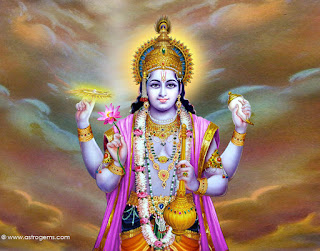Week 3 Story telling: Ravana and Rama prologue.
Long ago the Demon King Ravana accomplished great feats.
Because of his greatness, Brahma granted Ravana invulnerability to the Gods and
demons. With his relative immortality, Ravana was able to oppress all the gods.
He commanded them, controlled them. The Gods were unable to stand up to him.
Ravana made the God of death Yama his slave, subjected Agni and Vayu as well as
the sun and moon. Ravana demanded sacrifices from the gods. The gods sought out
protection. They begged Brahma to save them from Ravana. However, what he did
for Ravana could not be undone. In order to save the gods from him, Brahma told
the gods to go see Vishnu. Vishnu told the gods that Ravana did not have
protection from man or ape, and that they should become apes. Vishnu's plan was
to split his spirit into four parts, later to be born as a four mortal men.
When Vishnu's mortal forms reached a proper age, he would set out to defeat
Ravana and at that time he would need the help of the apes. Then, 10 months
later, a woman gave birth to four sons. The four souls of Vishnu, the four
Avatars of Vishnu. Of the four children, one stood out above the rest in both
beauty and skill. His name was Rama. Over the years Rama continued to
distinguish himself from his brothers. Any quest that one of the three brothers
was unable to complete, Rama would succeed with ease. Ravana learned of these
brothers and sent his demons out to slay them. However, Rama would not be so
easily defeated and while his brothers were unable to defeat them Rama felled
them with ease. And he set out on his journey to defeat Ravana.
Author's note: These were hard stories for me to retell
without just sounding like a summary of the original. Given my style of
retelling where I try to keep it original for learning purposes because I
really enjoy telling stories to friends and family, this one may have ended up
being a summary. The original story did not say how long after Vishnu told the
gods that he would help him, that his 4 avatars were born. Initially I thought
about saying nine months, however I felt that would mean that at the instant Vishnu
said that was his plan he would vanish. So I decided on ten months in order to
give a feeling of preparation for his spirit.
Bibliography: Source. Indian Myth and Legend by Donald A. Mackenzie (1913)



Hey Jake!
ReplyDeleteI agree with you 100% on how hard it is to retell these stories without taking away from the essence of the story. I appreciate how you provided an overview, which helps capture the audience. Growing up I have always read the Ramayana, but I read the version by Goswami Tulsidas, so there are variations on how people are described along with the events. Also, I completely understand when you mentioned your writing style, I have a tendency to do that too!
Hey Jake, I am not sure which version of The Ramayana you chose to read but in the book by R.K. Narayan (the version I read) we were only given about a paragraph that explains how Ravana became so powerful. We also learn very little about what other gods Ravana oppresses. I enjoyed your tale because it gave more information about the beginning and why Vishnu reincarnates as Rama. Great job!
ReplyDeleteHi again, Jake!
ReplyDeleteI enjoyed reading your story because it provided more background tale that had readers of the original tale wondering. On my storytelling this week, I also used a different style of writing instead of completely changing the plot simply because I didn't know how to retell such an epic! In terms of feedforward, I think it would help readers recall the original story if you provided a more detailed summary of the original. Anyway, great job retelling this story!
Hey Jake, your retelling was a good reminder of how Ravana became Ravana. It is good to see how he terrorized not only the creatures of the Earth but the gods as well because like the narrators of Sita Sings the Blues (the animated film version that's a reading option in week 5) say later in the story it seems like the only bad thing Ravana did was kidnap Sita.
ReplyDelete